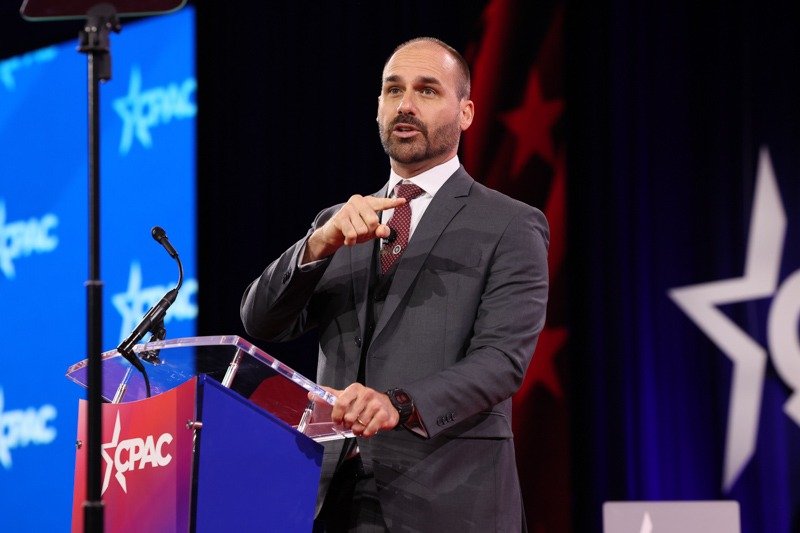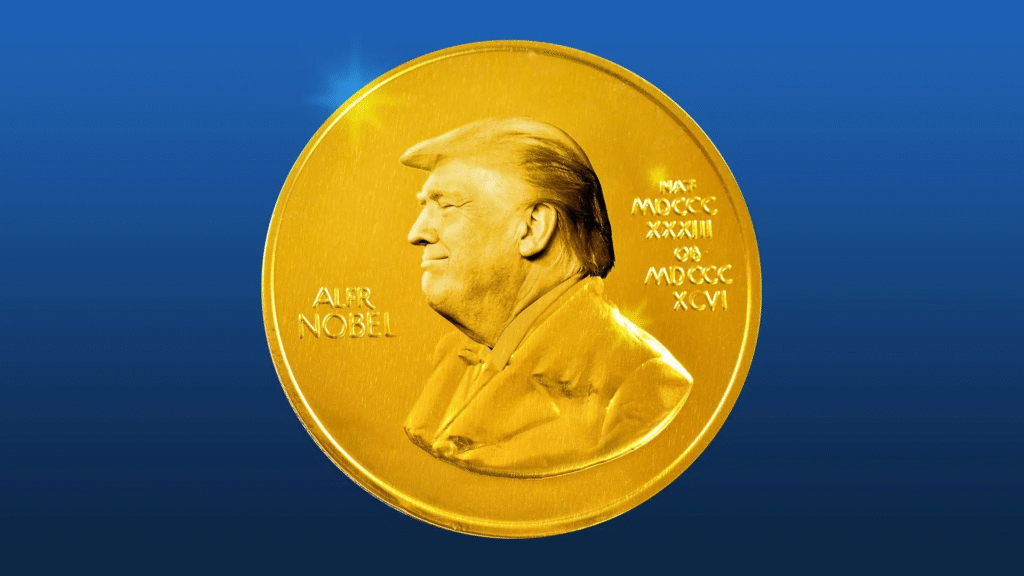Brazil is facing a delicate political situation that has also impacted the economic, judicial, and diplomatic spheres. This crisis has deepened following recent decisions by the Federal Supreme Court (STF) against former president Jair Bolsonaro, who is now subject to several restrictions, including wearing an electronic ankle monitor, being banned from using social media, contacting embassies, and even speaking with his own son, Congressman Eduardo Bolsonaro. As a result, the political climate in the country has become even more polarized. The Bolsonaro family claims to be the target of political persecution, which they allege is led by STF Justice Alexandre de Moraes.
In an interview with this outlet, Eduardo Bolsonaro summarized his key demands in three main points: “broad, general, and unrestricted amnesty; clean and transparent elections; and a Supreme Court without the human rights violator, Alexandre de Moraes”.
1. Let’s talk about Alexandre de Moraes.
Alexandre de Moraes is the main problem we face in Brazil today. He is leading a political crackdown and is using his position as a Supreme Court justice to carry out actions that are not only extraordinary, but also blatantly illegal. For example, there’s no ambiguity when he orders the freezing of my wife’s bank accounts—even though she has nothing to do with what’s happening in Brazil.
He launches investigations simply because U.S. Senator Marco Rubio mentioned the possibility of sanctions against him. After Rubio’s remarks, Moraes opened an investigation against me just for meeting with a U.S. congressman. That congressman was Cory Mills, who raised the issue with Rubio during a congressional hearing.
He also banned Jair Bolsonaro from social media even before any conviction was handed down. And that’s far from the worst thing Moraes has done. Take, for instance, the case of Congressman Daniel Silveira, who is currently in prison with a nearly nine-year sentence—for posting a video in which he harshly criticized Supreme Court justices, but without making any actual threats.
I don’t believe a functioning democracy should jail elected members of Congress for posting videos expressing opinions. And to make matters worse, Brazil’s Constitution—specifically Article 53—guarantees full parliamentary immunity. That means we, as lawmakers, are constitutionally protected for any words, opinions, or votes.
So what exactly is Alexandre de Moraes doing? In the U.S., this would be called the weaponization of the judiciary—something Donald Trump has experienced firsthand. It’s no wonder Trump feels a certain empathy toward Bolsonaro, seeing in him a version of himself under attack without the protection of a U.S. presidency.
And increasingly, the international press is starting to pay attention to who Alexandre de Moraes really is—not just conservative media, but even some left-leaning outlets are taking notice.
2. Do you see Alexandre de Moraes ever being investigated or even put on trial? Do you view him as a personal threat or a national one?
He’s not just a threat to Brazil—he’s a danger to the entire region, and to the Western world as a whole. For example, he was recently involved in a case where the Brazilian Supreme Court ruled in favor of regulating social media platforms. This has direct implications for American companies and their interests.
He has also created a new censorship apparatus that could easily be exported to other countries. That’s why defenders of free speech—like Trump, or even Senator JD Vance, who spoke out in Germany in March—won’t just sit back and let Moraes continue unchecked.
This issue of social media regulation is something Trump himself addressed in an open letter, where he also condemned the judicial persecution of Jair Bolsonaro, his family, and his supporters. And shortly after that, Trump imposed the world’s highest tariff—50%—on Brazil. Other countries received tariffs of 20% or 30%, but Brazil got 50%, and Trump made it clear: this isn’t just about economics. It’s about a deeper institutional crisis, rooted in political persecution.
3. Do you think the measures taken by the United States so far are enough? Or do you expect more to come?
There’s strong anticipation that more actions will be taken. Many expect that Alexandre de Moraes will soon be targeted under the Global Magnitsky Act—often referred to as “financial death penalty” sanctions. These kinds of sanctions don’t impact the Brazilian people—they’re aimed directly at individuals. And that’s what matters to them: their personal wealth and security.
There are even rumors of potential sanctions being announced as soon as next week—not just against Moraes, but also against his wife, Viviane Barci de Moraes, a lawyer whose earnings reportedly skyrocketed after her husband joined the Supreme Court. Other justices could be targeted as well. This is ultimately a political decision that Trump is expected to make—likely in consultation with Senator Rubio and others in the White House.
And I believe that once the cost of keeping Alexandre de Moraes on the Supreme Court becomes too high, things will change. He is, after all, a violator of human rights. Isolating him would allow the Brazilian Congress to operate without his threats. That could lead to the approval of what we call the Amnesty Bill, which would protect all those involved in the January 8th events and others currently being persecuted by Moraes. It would also allow political exiles—like myself—to finally return to Brazil.
And we could even see the return of Jair Bolsonaro to the political stage. Despite everything, he continues to lead in many presidential polls. So the conversation about him running again next year is not just possible—it’s very real.
4. Jair Bolsonaro is politically barred from running until 2030. Who might step in as a candidate? His wife Michelle Bolsonaro? Tarcísio de Freitas? Romeu Zema? Or perhaps you?
That’s a decision only Jair Bolsonaro can make. And without a doubt, the persecution he’s facing is directly tied to his popularity in the polls. Wherever he goes, huge crowds follow, and people rush to take photos with him. His popularity is unmatched.
Our goal is to ensure that if it’s not him, it will be someone else—but the more conservative and anti-establishment the candidate, the harder it becomes to even make it to the ballot next year. Take my own case: I’ve never had legal trouble, yet now Alexandre de Moraes has launched an investigation against me, accusing me of attempting to violently abolish the democratic rule of law—a charge that carries up to 12 years in prison.
On top of that, they’ve added another charge: inciting or encouraging foreign authorities to acts of war or invasion against Brazil. In other words, they’re suggesting that I’ve been speaking to Trump about invading Brazil—which could mean eight more years in prison.
So we’re dealing with a man holding a pen and doing everything in his power to eliminate the existence of a real right-wing alternative, a true opposition to Lula da Silva in the next election. In this climate, it’s very difficult to predict who might run.
I believe a lot can change between now and the election in October next year. Bolsonaro himself has said he won’t name a successor unless absolutely necessary—and only next year. He doesn’t want to do it early, because the system is pressuring him to do just that. If he announces someone now, that person immediately becomes a target. They lose political capital, lose public momentum, and the Supreme Court can more comfortably move against them under the radar. That’s why everything involving Bolsonaro today must be analyzed with strategic eyes—especially in relation to the Court.
5. Your father, Jair Bolsonaro, survived an assassination attempt. Are you concerned for your own safety?
Not at this moment. But if I were to officially become a candidate—yes, then I’d be concerned. That’s when political violence becomes “convenient” for those who oppose anti-establishment figures or strong right-wing candidates. Just look at what happened to Uribe in Colombia, to Villavicencio in Ecuador, to my father in 2018, and even to Trump in the U.S.
This kind of thing always seems to happen—but curiously, it never seems to happen to left-wing leaders. So yes, if I run for president in 2026, it would become a real concern. But for now, no. Because for anyone to attempt something against me, they’d have to cross borders or leave the U.S.—and that demands a higher level of sophistication and coordination.
6. How does Brazil’s political situation affect your decision to run or not?
Look, in an ideal and truly democratic scenario, Jair Bolsonaro would be allowed to run again. I’ll only consider running if he doesn’t choose me or if he decides not to run himself.
That’s the reality. And to be clear, I have no personal ambition to be president or to run for office. What I want is to restore freedom in my country.
We’ve seen polls showing that over 60%—specifically 61%—of Brazilians are afraid to express their opinions on social media. That’s not the hallmark of a democratic nation. That’s a country where freedoms are being crushed. And there are no tools left within Brazil to stop what’s happening.
That’s why we’re turning to our allies in the United States—freedom-loving allies—who understand the stakes. They know that preserving freedom of expression also means protecting the interests of U.S. companies in Brazil. And they won’t stand by while a new censorship model is exported to other countries in Latin America.
That’s the spirit behind this fight we’re in.
7. How do you view Lula da Silva — as a criminal or a legitimate leader?
He’s a criminal, without a doubt. Nothing has changed. It’s astonishing that in Brazil someone can go from prison to running for president in the 2022 elections—a process that was highly questionable.
For example, I was forced to delete posts in which I linked Lula to dictators like Nicolás Maduro and Daniel Ortega from Nicaragua. We couldn’t say anything about Lula supporting abortion or other similar topics.
Meanwhile, the left was free to lie and say whatever they wanted about us. It was that kind of election. My father, for instance, wasn’t even allowed to livestream from his own home due to a ruling by the Superior Electoral Court, led by Alexandre de Moraes. He argued that it would violate equal campaign conditions since Bolsonaro was the sitting president and lived in an official residence paid for with public funds.
That kind of restriction had never been imposed before—not on Lula, not on Dilma. Bolsonaro, on the other hand, was prohibited from using footage of international events, like his speeches at the United Nations, in his campaign ads. Lula and Dilma were always allowed to do so.
And mind you, I’m not even touching on the electronic voting machines or the fully digital nature of our electoral process. Leaving aside the concerns about that, just looking at the decisions made by the courts, it’s clear it wasn’t a fair contest. And in a country where the final result came down to just 1% of the vote, all of this had an undeniable impact.
That’s why I say these were not normal elections.
8. Given your extensive political career, what has been the hardest lesson or decision you’ve faced?
Definitely the 2022 election. We were up against a cowardly opponent who used the system against us.
It was extremely difficult to run a campaign where your opponents could say and do anything, while you couldn’t even name them. You couldn’t speak honestly about who your political adversaries were.
That campaign left a mark. And I truly hope Brazil doesn’t have to go through something like that again. I’m hopeful about the new makeup of the Superior Electoral Court. The justices rotate periodically, and the lineup will change for the 2026 election.
I hope this leads to greater transparency in our electoral process—maybe even with printed ballots and a system that allows for audits, rather than just relying on blind trust in a group of bureaucrats counting votes from a central office in Brasília.
9. Have you ever suspected that people within your inner circle might be betraying you—or betraying the Liberal Party?
Look, I do feel I could be receiving stronger support from my party, especially considering my current situation in the U.S. I’m still a congressman—I’m just on leave from the Chamber.
I’m not saying the party is being disloyal, but betrayal is unfortunately common in politics. I do my part to make the facts clear to people, and then it’s up to them to decide who the traitors are.
But I’ll say this: with Alexandre de Moraes holding this much power, the best-case scenario is a weak right wing. There won’t be a true opposition, even if some figures pretend to be. In a system this unbalanced, it’s almost certain that no one will be allowed to genuinely put the interests of the people ahead of the powerful.
10. Have you spoken to your father about the legacy he would leave behind if he were arrested?
No. Alexandre de Moraes has forbidden me from speaking with my father. If I speak to him, Moraes could order his arrest even before any conviction is issued.
11. How do you respond to those who accuse you of destabilizing Brazil by acting as a bridge between Trump and your country?
I’m proud of it.
When I look at the comments on my social media, I see people saying I’m doing more than many other politicians—they say I’m doing everything I can. There’s strong recognition for my work abroad, and that’s because many Brazilians have realized there are no longer any tools left inside Brazil to change things. If things were already tough under Bolsonaro, imagine now with Lula da Silva back in the presidency.
So those accusations don’t bother me. I’m confident that I’m doing the right thing. I constantly question myself, reflect, and ask whether I’m acting according to my principles—not based on electoral calculations.
12. Do you believe Brazil might go as far as banning your party, the Liberal Party, from participating in next year’s election?
If they get the chance, they will absolutely do it. But they need a pretext—a way to justify it in the name of “protecting democracy.”
Take this: our party challenged the 2022 election results before the Superior Electoral Court, and we were fined 22 million reais—roughly 3 to 4 million U.S. dollars. And Alexandre de Moraes, in a mocking move, made the fine exactly 22 million—which just so happens to be the ballot number for our party.
That’s the number voters would punch in to vote for Bolsonaro: 22.
So we need to be extremely cautious. If the right conditions arise, this corrupt system will absolutely try to do the same thing that’s happening to the AfD in Germany. They began by labeling them “anti-democratic,” and then moved to ban them from the elections. That’s the dream of this system. And that’s exactly what we’re fighting against from abroad.
13. If you had to choose between your own political future or your father’s, which would you prioritize?
Seeing my father free. He’s not a criminal, and he should be allowed to run for president again in fair, transparent elections next year.
In that scenario, I’d run for the Senate representing the state of São Paulo. That, to me, would be the perfect outcome. And I hope we can achieve it—because that outcome would also mean Brazil has returned to being a true democracy.
Look, I’ve never fought for privileges for my father. I’ve never tried to guarantee his election through favors or endorsements. We’ve only fought for clean elections—so that there are no more political prisoners.
It’s absurd to claim Bolsonaro tried to stage a coup on January 8 when he wasn’t even in Brazil. That date is during the holiday season, and yet they arrested hundreds of people—including elderly women over 70 years old. These were unarmed civilians. Not a single shot was fired. And some of these people are now being sentenced to up to 17 years in prison.
That’s not the Brazil we want. That’s not the Brazil the people want. That’s the Brazil of this maniac named Alexandre de Moraes. And I hope Trump places him exactly where he belongs.
14. What are your thoughts on the São Paulo and Puebla Forums? Do you think there’s international pressure—from the EU or Latin American leftists—to eliminate you politically?
Yes, absolutely. These groups are well-organized and heavily funded by public money.
Look at how Brazil once again is doing deals with Venezuela’s narco-dictatorship. Brazil has always played the role of the “fat cow,” financing these regimes.
When Lula was first elected in 2002, Cuba was on the verge of collapse. What did we do? We built them a port—the Port of Mariel—using hundreds of millions of Brazilian taxpayer dollars, funded through our public bank, BNDES.
They’re always helping each other—through logistics, financing, and even ideological coordination. Just recently, Lula sent a Brazilian Air Force jet to Peru to pick up the corrupt former First Lady, Nadine Heredia, and bring her to Brazil. Then Lula went to Argentina and posed for a photo with convicted former President Cristina Kirchner, holding a sign that said “Cristina Libre.”
That is what real foreign interference looks like. It’s interference in the judiciary and sovereignty of other nations. Not what Trump is doing.
Trump is defending the interests of American companies and citizens—especially now that Alexandre de Moraes has issued arrest warrants against U.S. citizens for posts they made on U.S. soil.
That’s what’s happening now. And many of these actions are laying the groundwork for the application of the Magnitsky Act against Alexandre de Moraes.
15. When will you return to Brazil?
If I return to Brazil today, I will almost certainly be arrested.
So first, we need to remove Alexandre de Moraes from the Supreme Court—or at the very least, strip him of the powers he’s been abusing. Only then will there be a minimum level of safety for me to return.
And I hope that day isn’t far off. But if it comes to it, I’ll remain here in the United States, fighting against this rotten system for as long as I have the strength.
I just hope I won’t have to do it for the rest of my life—like so many Cubans who died in exile, or like the Venezuelans we see suffering today.
May God bless and protect us. Because in the end, we’re only asking for three things:
- A broad, general, and unrestricted amnesty;
- Clean and transparent elections;
- And a Supreme Court free from human rights violators like Alexandre de Moraes.
If we can achieve that, then I’ll be able to return to Brazil.

IMPORTANT
This content is the exclusive property of Newsyman © and is protected by copyright laws. If you wish to reproduce it, please be sure to mention our media, the author and include a link to this page.






